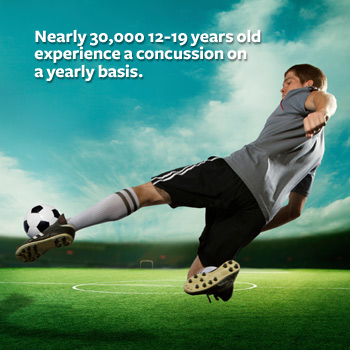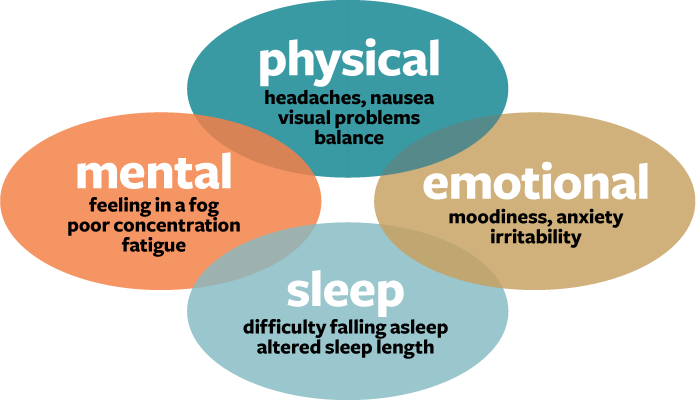Concussion Facts
Understand what's happening with your brain.
What is a Concussion?
Put simply, a concussion (otherwise known as a mild traumatic brain injury (mTBI)) is an injury to your brain is brought about by fast, jarring jolt to the brain. There are a number of possible situations where this can happen:
- A blow to the head (in contact sports)
- Severe shaking of the head (like when you fall down)
- Coming to a rapid stop (like in a car accident).
Remember that brain is housed within the cranium (aka your skull) and when you experience a blow to the head or a jarring movement your brain can move and twist with your cranium resulting in injury to your brain.

The fastest recoveries happen when assessed within 72 hours by qualified professionals.
– Sport Concussion Symptom Recovery/Return to Participation of Patients Presenting to a Community Physiotherapy Clinic
Codi Isaac PT; Megan Ogle, MSc. Mec; Calla Isaac, BSc; Ann Marie Przyslupski, MSc; Constance Lebrun, MDCM, MPE, CCFP(SEM), FCFP, Dip. Sport Med, FACSM
Presented in poster format and abstract published as part of conference proceedings.
Consensus Statement on Concussion in Sport – the 6th International Conference on Concussion in Sport held in Amsterdam, November 2022
What are the Symptoms of a Concussion?
Figuring out if you've had a concussion can be pretty hard sometimes. But experienced healthcare providers are going to listen to you describe what happened and how you felt. The things you feel are "symptoms". We also examine certain "functions" we know come from the brain and are affected by concussion. Together, this tells us if you are experiencing or had a concussion.
First, let's breakdown the symptoms you can have with a concussion. We've put together this visual to show how symptoms exist creating your concussion experience.

Physical Symptoms
Physical concussion symptoms can include:
- Headaches
- Visual problems
- Dizziness
- Noise and/or light sensitivity
- Nausea/vomiting
- Balance problems
Emotional Changes
Emotional changes can include feeling more irritable than normal as well as a general increased level of nervousness. As well, you could feel more emotional; experiencing daily mood swings or a sense of sadness.
Mental Changes
Not only can you experience physical and emotional changes with a concussion, you can also experience cognitive/mental changes; these include:
- Fatigue
- Fogginess or drowsiness
- Difficulty concentrating or remembering facts and people
- Slower mental "processing"
Altered Sleep
Unfortunately your sleeping pattern can also be affected by a concussion. You may have more difficulty falling asleep, and your sleeping time may fluctuate causing you to sleep or shorter or longer than normal.
What Should I Do After a Concussion?
Let's remember that a concussion is an injury to the brain. Just like a strained muscle needs rest, so does your brain after a concussion. But how does a brain "rest" and how long is needed?
. An initial time to rest that is not too long and not too strict is a good idea but VERY STRONG evidence exists to say that we can end up resting too much or in a way that actually harms our ability to recover.
The best evidence is for guided, custom activity, right from the first 24-48 hours.
The easiest and quickest recoveries are happening to people who get assessed within the first 24-48 hours. Our therapists provide custom rest and activity prescriptions based on your injury and knowledge of the best research out there.
Exercise is medicine for concussion
– Consensus Statement on Concussion in Sport – the 6th International Conference on Concussion in Sport held in Amsterdam, November 2022
What Does Return to Life, Work and Sport Look Like?
Getting back to sport or work after a concussion can be a challenging process. You may wonder if you're pushing yourself too hard or too little. And sometimes our self-assessment of our symptoms can be tricky.
The rehabilitation of a concussion with a focus on graduated return to sport would start from no activity (rest) to light aerobic activity such as biking or walking. During this time it is important to understand what is triggering any recurrence of concussion related symptoms. For most people this relates to headaches and dizziness.
From there we progress to sport-specific exercise while avoiding any risk of a new injury. More complex training skills can be incorporated if you are progressing well.
A return to full contact play should only be considered once you've been cleared by a qualified medical professional with standards for "measuring" recovery.
How Can Concussion Physiotherapy Help?
Good question!
Returning back to normal life, including a full and safe return to sport and work, is not always simple. Every concussion is unique and concussion physiotherapy seeks to understand the features of your specific concussion injury.
We apply the latest research to our clinical assessment and treatment process. Our thorough evaluation can uncover the physical impacts of your injury to ensure that you receive a treatment program that helps give you full resolution of your symptoms and return your function.
Addressing your symptoms is important but we go a step further and make sure that your vestibular and balance systems as well as your cognitive and cervical functioning have returned to normal and expected values.
We want you to have the confidence that there are no lingering issues affected by your concussion injury. By treating the whole person, you can be confident that you have minimized any potential long term effects from the concussion.
This is also called injury prevention.
Even if you have received treatment somewhere else and it feels like it has been for "too long," we have experience with these special challenges and it is still possible to recover.”
Codi Isaac, PT; Megan Ogle, MSc Mec Eng; Calla Isaac, BSc; Ann-Marie Przyslupski, MSc; Constance Lebrun, MDCM, MPE, CCFP(SEM), FCFP, Dip. Sport Med, FACSM
Ready to find out more?
Ready to move forward in your concussion recovery?
